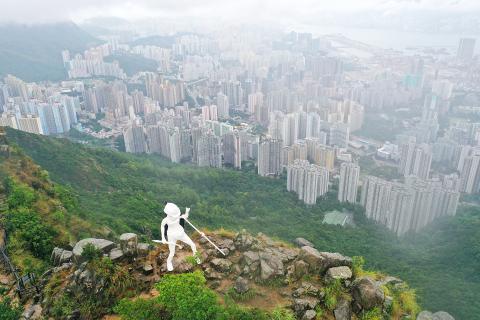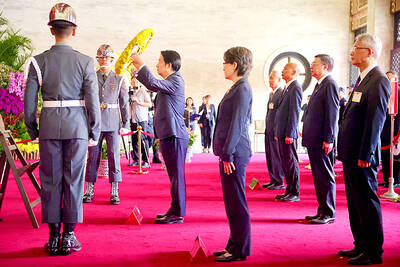Pro-democracy protesters early yesterday hauled a 4m statue known as “Lady Liberty” to the top of a famous Hong Kong mountain, announcing the peak would be its “final resting place.”
The statue depicts a female protester in a gas mask, protective goggles and helmet, an umbrella in one hand and a black flag in the other, proclaiming the protest slogan “Liberate Hong Kong, revolution of our times.”
It was a regular feature at larger, more peaceful rallies this summer, eliciting cheers when it was wheeled in by volunteers and transported around the territory on the back of a truck.

Photo: EPA-EFE / Kwang Kung Temple handout
However, organizers yesterday said Lady Liberty had made her final journey as they unveiled her at the top of Lion Rock, a 495m peak overlooking a forest of skyscrapers that is intimately linked to the territory’s democracy movement.
Alex, a 32-year-old protester who created the statue, said volunteers used the cover of night to carry the 80kg artwork up the steep path to the summit.
“We had a team of 16 climbing professionals carrying her in two main pieces all the way to the summit, while another 16 members carried equipment and supplies,” he told reporters, only giving his first name.
“Lion Rock will be the final resting place of the Lady Liberty of Hong Kong,” the team said in a statement, adding that it would be up to authorities to what to do with it.
Named because its shape resembles the big cat, Lion Rock has been a symbol of Hong Kong’s pro-democracy movement for years, with large banners demanding freedoms or criticizing Beijing frequently unfurled by hardy protesters.
“Lion Rock spirit” is used by Hong Kongers to summarize the territory’s can-do attitude — as well as its reputation for liberty compared with authoritarian China.
The mountain overlooks Kowloon’s densely packed working-class districts, where many escaping communist China during the worst excesses of the era of Mao Zedong (毛澤東) settled.
During 2014’s “Umbrella movement” pro-democracy protests, demonstrators unfurled a huge yellow banner down one of the rock’s cliff faces, linking the mountainside to modern-day acts of civil disobedience.
During the Mid-Autumn Festival last month, hundreds of protesters gathered on Lion Rock and other peaks surrounding the territory shining laser pens and lanterns.
Alex said it was inspired by the “Goddess of Democracy” statue that pro-democracy protesters erected in 1989 inside Tiananmen Square before the Chinese government crushed the movement.
A version of the Goddess of Democracy is a feature of the annual June 4 Tiananmen vigils in Hong Kong, the only place in China where commemorations of the crackdown can be held.
However, with the territory rocked by unprecedented protests aimed at halting sliding freedoms under Beijing’s rule, advocates wanted to create a Hong Kong version of the Goddess of Democracy.
Much like the protests themselves — which are leaderless and organized online — the design for Lady Liberty was crowd-sourced.
“We invited design proposals on LIHKG, organized a universal vote asking people to pick their favorite design,” Alex said, referring to the most popular forum for Hong Kong protesters.
Asked why they had chosen Lion Rock to be the statue’s final resting place, he said it was “a symbolic gesture to infuse a refreshed mindset for the fight for democracy.”
The mountain and the statue represented “the fundamental values and beliefs” of the protest movement, he said.

RESPONSE: The transit sends a message that China’s alignment with other countries would not deter the West from defending freedom of navigation, an academic said Canadian frigate the Ville de Quebec and Australian guided-missile destroyer the Brisbane transited the Taiwan Strait yesterday morning, the first time the two nations have conducted a joint freedom of navigation operation. The Canadian and Australian militaries did not immediately respond to requests for comment. The Ministry of National Defense declined to confirm the passage, saying only that Taiwan’s armed forces had deployed surveillance and reconnaissance assets, along with warships and combat aircraft, to safeguard security across the Strait. The two vessels were observed transiting northward along the eastern side of the Taiwan Strait’s median line, with Japan being their most likely destination,

‘NOT ALONE’: A Taiwan Strait war would disrupt global trade routes, and could spark a worldwide crisis, so a powerful US presence is needed as a deterrence, a US senator said US Senator Deb Fischer on Thursday urged her colleagues in the US Congress to deepen Washington’s cooperation with Taiwan and other Indo-Pacific partners to contain the global security threat from China. Fischer and other lawmakers recently returned from an official trip to the Indo-Pacific region, where they toured US military bases in Hawaii and Guam, and visited leaders, including President William Lai (賴清德). The trip underscored the reality that the world is undergoing turmoil, and maintaining a free and open Indo-Pacific region is crucial to the security interests of the US and its partners, she said. Her visit to Taiwan demonstrated ways the

GLOBAL ISSUE: If China annexes Taiwan, ‘it will not stop its expansion there, as it only becomes stronger and has more force to expand further,’ the president said China’s military and diplomatic expansion is not a sole issue for Taiwan, but one that risks world peace, President William Lai (賴清德) said yesterday, adding that Taiwan would stand with the alliance of democratic countries to preserve peace through deterrence. Lai made the remark in an exclusive interview with the Chinese-language Liberty Times (sister paper of the Taipei Times). “China is strategically pushing forward to change the international order,” Lai said, adding that China established the Asia Infrastructure Investment Bank, launched the Belt and Road Initiative, and pushed for yuan internationalization, because it wants to replace the democratic rules-based international

WAR’S END ANNIVERSARY: ‘Taiwan does not believe in commemorating peace by holding guns,’ the president said on social media after attending a morning ceremony Countries should uphold peace, and promote freedom and democracy, President William Lai (賴清德) said yesterday as Taiwan marked 80 years since the end of World War II and the Second Sino-Japanese War. Lai, Vice President Hsiao Bi-khim (蕭美琴) and other top officials in the morning attended a ceremony at the National Revolutionary Martyrs’ Shrine in Taipei’s Zhongshan District (中山) to honor those who sacrificed their lives in major battles. “Taiwanese are peace-loving. Taiwan does not believe in commemorating peace by holding guns,” Lai wrote on Facebook afterward, apparently to highlight the contrast with the military parade in Beijing marking the same anniversary. “We